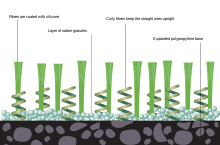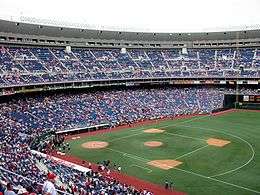Artificial turf–cancer hypothesis

Artificial turf is surface of synthetic fibers resembling natural grass. It is widely used for sports fields for being more hard-wearing and resistant than natural surfaces. Most use infills of crumb rubber from recycled tires, which use is controversial because of concerns that the tires contain carcinogens.[1]
Studies
An unpublished study by Rutgers University examined crumb rubber from synthetic fields in New York City. It found six possibly carcinogenic Polycyclic aromatic hydrocarbons at levels excessive to state regulations. The researchers warned that the findings could have been made inaccurate by solvent extraction used to release the chemicals from the rubber.[2]
In 2014, Amy Griffin, soccer coach at the University of Washington, studied American players of the sport who had developed cancer. Of 38 players, 34 were goalkeepers, a position in which diving to the surface makes accidental ingestion or blood contact with crumb rubber more likely, Griffin has asserted. Lymphoma and leukemia, cancers of the blood, predominated.[3]
In late 2015, the United States Congress' House Energy and Commerce Committee ordered for the Environmental Protection Agency (EPA) to investigate a link. EPA, the Consumer Product Safety Commission and the Centers for Disease Control and Prevention are investigating.[4]
Testimonies

AstroTurf was used at Veterans Stadium, the former home of the Philadelphia Phillies. Five of their players at the time – Ken Brett, Darren Daulton, Johnny Oates, Tug McGraw and John Vukovich – developed brain cancer. The only four other Major League Baseball players of the era to develop the condition, all played at the same arena on visiting teams. Ex-players and relatives have speculated that there is something about the stadium causing these incidents, including highlighting the artificial turf. However, the Philadelphia Eagles of the National Football League shared the stadium without any known cases of brain cancer.[5]
Former Liverpool F.C. player Gary Ablett died of Non-Hodgkin lymphoma in 2012, at the age of 46. His widow Jacqueline expressed fears that his time coaching on artificial turf was a cause.[6]
Nigel Maguire, formerly a chief executive for the National Health Service in Cumbria, believes that his son, a goalkeeper, developed Hodgkin's lymphoma by playing on an artificial surface. He has called for a ban on the surfaces, saying "It is obscene so little research has been done. This multibillion-dollar industry is conducting an industrial-scale experiment on our kids – it's a scandal."[7]
Reactions
FIFA, the world governing body of association football (soccer), has claimed that the evidence weighs in favour of artificial pitches being safe. The Football Association of England stated in February 2016 that they were observing reports and conducting their own research on the issue.[7]
References
- ↑ Hughes, Geraint (3 February 2016). "Report claims link between 3G pitches and cancer". Retrieved 17 February 2016.
- ↑ "Laboratory Identification of Compounds Released from Tire Crumbs and Rubber Mulch". Environment and Human Health Inc. Retrieved 16 February 2016.
- ↑ Rappleye, Hannah (8 October 2014). "How Safe Is the Artificial Turf Your Child Plays On?". NBCNews.com. NBCUniversal Media, LLC. Retrieved 16 February 2016.
- ↑ Ozanian, Mike (13 February 2016). "Government Finally To Look Into Possible Link Between Artificial Turf And Cancer". Forbes.com. Retrieved 16 February 2016.
- ↑ Miller, Randy (July 22, 2013). "Ex-Phillies wonder if stadium is to blame for players' brain cancer". USA Today. Retrieved 6 November 2015.
- ↑ Byrne, Paul (11 February 2016). "3G football pitch safety fears prompt calls for more research from widow of Gary Ablett". Liverpool Echo. Retrieved 16 February 2016.
- 1 2 "Fake football pitches gave my teenage son cancer, says former NHS boss". The Daily Telegraph. 15 February 2016. Retrieved 16 February 2016.